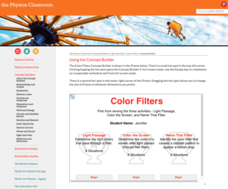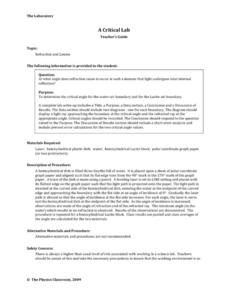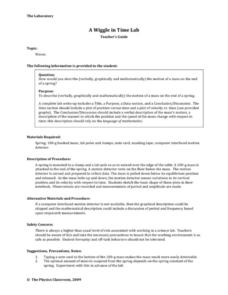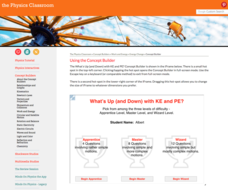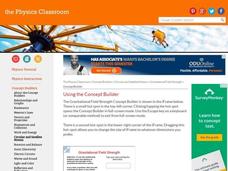Physics Classroom
Color Filters
Filters provide amusing changes to images in applications other than just Instagram! High school pupils apply their knowledge of colored filters to three different interactive sets of puzzles. They identify light colors that pass through...
Physics Classroom
Color Pigments
Objects contain pigments that selectively absorb a wavelength of light, and our eyes only observe a very small range of these wavelengths. Scholars apply these two facts to three different activities. They identify the pigment in an...
Physics Classroom
If This, Then That: Color
The dress color debate of 2015 taught the importance of understanding how we see light. Scholars view a shirt under two different colored lights and then must predict what color the shirt will appear under a third light. They apply color...
Physics Classroom
Light Intensity
Light intensity varies by the strength of the light bulb as well as the distance to the light bulb. Pupils apply these concepts independently at first. They must solve for the light intensity as either the distance or the wattage of the...
Physics Classroom
Spectrum
Scholars relate each of the colors in the spectrum, except indigo, by comparing their frequencies, wavelengths, and energy levels. Then, they compare each section of the electromagnetic spectrum when considering the same three variables.
Physics Classroom
Total Internal Reflection
Scholars work through three different activities applying their knowledge of total internal reflection (TIR). First, they simply identify which diagrams create TIR and which don't. Next, they match different types of boundary behaviors...
Physics Classroom
The L.O.S.T. Art of Image Description - Converging Lenses
Magnifying glasses and cameras often use converging lenses, but how do they alter an image? Pupils discover a lens, axis, and object arrow before identifying four characteristics of the resulting image. They label the location,...
Physics Classroom
Law Enforcement - Refraction
Pupils apply their knowledge of refraction to four different sets of challenges. Each of the first three focus on one variable's impact on the direction of bending. The fourth combines variables for greater challenge.
Physics Classroom
The L.O.S.T. Art of Image Description - Curved Mirrors
We see curved mirrors every day in spoons, rear-view mirrors, stores as a safety measure, make-up mirrors, and in novelty stores. Scholars explore the changes to an image based on the curve of the mirror, the location of the image, and...
Physics Classroom
Who Can See Who?
While only briefly mentioned in most Physics books, plane mirrors and their applications offer the basics necessary for future studies. While working through an interactive, pupils demonstrate knowledge of both reflection and its forms....
Physics Classroom
Law of Reflection
Reflection seems simple to understand, but without a complete understanding, pupils struggle with ray diagrams, specular versus diffuse reflection, total internal reflection, and image formation. An engaging interactive provides three...
Physics Classroom
A Critical Lab
Physics lab groups finagle with laser lights to determine the critical angle of refraction for both water and Lucite. Because there are no detailed steps or an answer key for this enlightening exercise, an inexperienced physics...
Physics Classroom
A Wiggle in Time Lab
Though an alternative method is suggested, the best way to carry out this investigation is with the use of a computer-interfaced motion detector. Physics fanatics hang a mass on the end of a spring and analyze its motion verbally,...
Physics Classroom
As the Crow Flies Lab
A simple, yet memorable, way of practicing with displacement vectors is described here. Divide your class into groups and assign each a different landmark on campus. They measure smaller legs of the path from the classroom to their...
Physics Classroom
Momentum
Interactive emphasizes understanding magnitude of momentum vectors depends upon mass and velocity, while the direction of the vector only relates to the direction of movement. As part of the larger series on momentum and collision, three...
Physics Classroom
Component Addition
Learn to analyze vector addition on graph paper through multiple levels of practice problems. Pupils begin with two component addition and move through three and four components to prove mastery as one part of a series on vectors and...
Physics Classroom
Work
Current work lesson plan just not ... working? Add an engaging interactive that helps pupils explore positive and negative work relationships! Individuals assess situations to determine what type of work, if any, the resource describes....
Physics Classroom
What's Up (and Down) with KE and PE
Physics class has its ups and downs ... especially when it involves energy concepts! Scholars analyze information to determine changes in kinetic and potential energy using an interactive resource. Realistic scenarios make connecting...
Physics Classroom
Energy Ranking Tasks
Here's an interactive with real potential ... potential energy, that is! Scholars analyze scenarios, then rank objects in order of greatest to least kinetic energy, potential energy, and speed. The interactive provides support materials,...
Physics Classroom
Using Graphs
Many university professors complain incoming scholars struggle with interpreting graphs. A skill builder offers three different types of exercises including calculating slope, interpreting graphs, and extrapolating outside the plotted...
Physics Classroom
Name That Energy
Many upper level tests require pupils to interpret written descriptions of scientific principles. Scholars practice the skill by working through three levels of difficulty. Each question covers kinetic energy, gravitational potential...
Physics Classroom
Fnet = m•a
Most pupils learn quickly how to apply Newton's Second Law equation to calculate net force. However, many struggle to determine net force before calculating the value of an unknown force from a force diagram. As part of a larger series...
Physics Classroom
Gravitational Field Strength
Budding scientists fall hard for a gravitational field strength activity! Physics pupils compare the masses and distances relative to the center of planets using an interactive from a Circular and Satellite Motion series. Individuals...
Physics Classroom
Torque-ing About Rotation
Let's talk torque! Science scholars evaluate experimental setups during an interactive from the Rotation and Balance series. Individuals calculate the torque of differently arranged weights to determine the effect they have on a balanced...


